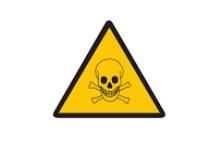The concept of cyanide , which comes from the French word cyanure , refers to an anion that has a carbon atom linked to a nitrogen atom through a triple bond. Organic compounds that have this type of bonding of atoms are called cyanide groups or nitriles .
 The most common form of cyanide is the salt of hydrogen cyanide , also known as hydrogen cyanide . This substance is characterized by its high toxicity , which can be lethal to humans .
The most common form of cyanide is the salt of hydrogen cyanide , also known as hydrogen cyanide . This substance is characterized by its high toxicity , which can be lethal to humans .
Hydrogen cyanide arose naturally within the framework of the development of life on our planet . It is part of plants, insects and microorganisms as a protection method. It is also generated in various combustion processes, being present in tobacco smoke and in the smoke emanating from automobiles during operation.
At an industrial level, cyanide is obtained by combining ammonia with natural gas or as a byproduct derived from the production of acrylic fibers. Its uses are varied: the manufacture of plastics and paints; the production of pesticides; drug development; and silver and gold mining are some of the activities carried out using cyanide, which can appear as hydrogen cyanide , potassium cyanide , sodium cyanide , etc.
It should be noted that cyanide, due to its toxicity, causes damage when ingested or inhaled or when in contact with the skin .
Specifically, cyanide, which as we have mentioned is highly toxic, it should be noted that it can have serious consequences for the human body. Specifically, it causes situations like these:
-Prevents the process of cellular respiration.
-It causes what is known as cytotoxic hypoxia, which can lead to the death of the individual.
-It brings with it seizures.
-It causes the heart rate to go faster than normal.
-There is an increase in the size of the pupils.
-It causes the person who is in contact with it to have much colder skin and even appear damp.
-Anyone who comes into contact with cyanide will feel like they are suffocating and will experience an internal burning sensation.
-When the person has been poisoned with cyanide, in the final stretch of the process they will see that their heart rate becomes much slower, their limbs and lips will turn blue, their body temperature will drop sharply...
Therefore, in any of these cases, it is necessary to go to a doctor to provide the necessary assistance.
In addition to everything indicated, we have to point out the existence of a play that uses the term that concerns us now. We are referring to "Cyanide, alone or with milk?", written by Juan José Alonso Millán.
It premiered at the Teatro Beatriz in Madrid on June 7, 1963 and tells the story of a mother and daughter who live in a mansion in Badajoz with their cantankerous grandfather, who reaches 90 years of age. One night they even consider ending the life of that old man, but a cousin, a doctor by profession, will appear on the scene and change the course of events.
